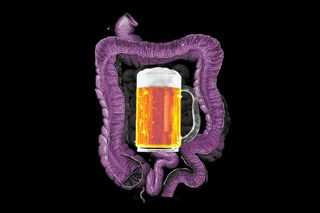
Having a Beer a Day May Be Good for Our Gut Health, Finds a Small Study
“While the findings suggest that one bottle of beer a day may be beneficial to gut health, the scientists do emphasize that the safest level of alcohol consumption is none.”

An apple a day keeps the doctor away. Pair it with a glass of lager, and your gut may turn out even healthier, according to a new study.
Published in the Journal of Agricultural and Food Chemistry, the randomized, double-blind study found that moderate consumption of beer can increase the diversity of people’s gut bacteria. The microbes in our gut are incredibly important for our wellbeing: they aid digestion, protect our bodies against disease-causing bacteria, and regulate our immune system, while also producing essential nutrients to supply us with. Not only that, but they can also help our bodies produce more serotonin, the “feel-good hormone.” And so, scientists are increasingly studying ways to improve individual gut health.
The new research adds to that. “Our study shows that beer is a complex product made of ingredients that can modulate our gut with a positive impact. Products with this nutritional richness and low or no alcohol are very interesting to be included as a part of a well-balanced diet and a healthy lifestyle,” said co-author Ana Faria from the Nova University of Lisbon.
The researchers conducted the study over a four-week period, with study participants being given 325 ml of beer — either non-alcoholic or alcoholic — with supper every day. The participants’ gut microbiota was examined both before and after the study. Their feces and blood samples, too, were tested. Turns out, while boosting the diversity of gut flora, beer consumption didn’t adversely impact the participants’ body weight, fat mass, or even their heart health and metabolism.
“One thing we know is [drinking beer] increased diversity, and we know many diseases reduce diversity… So, diversity, in general, is typically a good sign, but I don’t read more than that into it,” Ashkan Farhadi, a gastroenterologist from California, who wasn’t involved in the study, told Healthline, explaining that “Our understanding of the population of the microbiome in the gut is just like having a telescope on the moon and looking at the people on Earth and asking, ‘What is the role of each individual in their family in their environment and their personality?'”
Related on The Swaddle:
How Sleeping Next to Our Partners Can Improve Our Health and Wellbeing
To the researchers’ merit, though, they were able to establish a positive impact of beer consumption on the participants’ intestinal health — by finding higher levels of alkaline phosphatase present in their feces, indicating healthier intestines.
“While the findings suggest that one bottle of beer a day may be beneficial to gut health, the scientists do emphasize that the safest level of alcohol consumption is none,” noted New Atlas, reporting on the study. “In addition to established health risks such as liver disease, high blood pressure, and heart disease, recent research has uncovered direct causal links with cancer.”
The good news, however, is that the benefits of drinking beer don’t necessarily have to flow from alcoholic beer; non-alcoholic variants work just as well. So, unless one dove into the findings of this study hoping to feel better about their Friday night drinking plans, the news of a relaxing, chilled beverage bettering our gut health is indeed a win-win.
But there is a problem — or, two — with this study. The first is that its dataset was rather tiny, comprising just 22 people. So, more dedicated and comprehensive scientific studies must still explore just how and how much beer impacts health for a larger group of people.
Related on The Swaddle:
Study: Estrogen May Make Alcohol Consumption Feel More Rewarding to Women
The second, major issue, however, was that all 22 of these participants were male — why the researchers deemed the impact of beer consumption on women not worthy of digging into is unclear. Male-only studies — yet another example of the age-old gender bias in medicine — are often conducted under the intuitively, if not obviously, erroneous premise that what works for men’s bodies will also work for women. The brunt of the assumption, naturally, is borne by women.
A 2001 report by the U.S. Government Accountability Office found that 80% of the prescription drugs withdrawn from the market posed greater health risks to women in the form of side effects — a consequence that could’ve been avoided by including more women in studies. Yet, between 2004 and 2013, women in the U.S. dealt with 2 million drug-related adverse events; for men, the number was far lesser at 1.3 million.
“For much of documented history, women have been excluded from medical and scien[tific] knowledge production, so essentially we’ve ended up with a healthcare system, among other things in society, that has been made by men for men,” Kate Young, a public health researcher at Monash University in Australia, had told The Guardian in 2019.
Evidently, the documented present isn’t very different either. So, if you’re a woman — or, basically, anyone but a cis-male individual — unfortunately, the researchers have no data to assure you whether drinking beer is good for your gut health. But, then again, women shouldn’t drink either way, should they? If they’re out partying, or sipping beer in front of the TV, who will do all the housework? Not men, surely.
Devrupa Rakshit is an Associate Editor at The Swaddle. She is a lawyer by education, a poet by accident, a painter by shaukh, and autistic by birth. You can find her on Instagram @devruparakshit.
Related


All You Need to Know About Separation Anxiety Disorder
